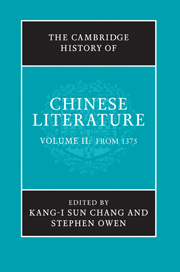Book contents
- Frontmatter
- Introduction to Volume II
- 1 Literature of the early Ming to mid-Ming (1375–1572)
- 2 The literary culture of the late Ming (1573–1644)
- 3 Early Qing to 1723
- 4 The literati era and its demise (1723–1840)
- 5 Prosimetric and verse narrative
- 6 Chinese literature from 1841 to 1937
- 7 Chinese literature from 1937 to the present
- Epilogue: Sinophone writings and the Chinese diaspora
- Select Bibliography
- Glossary
- Index
- References
6 - Chinese literature from 1841 to 1937
Published online by Cambridge University Press: 28 May 2011
- Frontmatter
- Introduction to Volume II
- 1 Literature of the early Ming to mid-Ming (1375–1572)
- 2 The literary culture of the late Ming (1573–1644)
- 3 Early Qing to 1723
- 4 The literati era and its demise (1723–1840)
- 5 Prosimetric and verse narrative
- 6 Chinese literature from 1841 to 1937
- 7 Chinese literature from 1937 to the present
- Epilogue: Sinophone writings and the Chinese diaspora
- Select Bibliography
- Glossary
- Index
- References
Summary
This chapter deals with the rise and development of Chinese literature from the end of the First Opium War (1840–1842) to the eve of the Second Sino-Japanese War (1937–1945). During this period, China was in constant turmoil, wracked by military upheaval on the one hand – the Opium Wars, the First and Second Sino-Japanese Wars, the Taiping Rebellion, and the Boxer Rebellion – and on the other hand by cataclysmic social changes running the gamut from technological and commercial advancement to epistemological renovation. Indigenous innovations and foreign stimuli, radical provocations and conciliatory responses were in drastic contestation. The impact of these multifaceted challenges was such that, by the end of the nineteenth century, officials and intellectuals alike were in agreement that changes were taking place that had been “unthinkable for the past three thousand years.”
This was also a period that saw literature conceived, practiced, circulated, and assessed in ways without precedent in Chinese history. Imported printing technology, innovative marketing tactics, increased literacy, widening readership, the boom in diverse forms of media and translation, and the advent of professional writers all created fields of literary production and consumption that in the preceding decades would hardly have been imaginable. Along with these changes, literature – as aesthetic vocation, scholarly discipline, and cultural institution – underwent drastic, often vehemently contested, experimentation to become “literature” as we understand the meaning of the word today. The transformation of literature was indeed one of the most acute symptoms of a burgeoning Chinese modernity.
- Type
- Chapter
- Information
- The Cambridge History of Chinese Literature , pp. 413 - 564Publisher: Cambridge University PressPrint publication year: 2010
References
- 2
- Cited by

